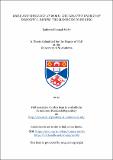Files in this item
Bible and theology at work : the creative energy of Dorothy L. Sayers' 'The man born to be king'
Item metadata
| dc.contributor.advisor | Wolfe, Judith (Judith E.) | |
| dc.contributor.author | Wehr, Kathryn Hannah | |
| dc.coverage.spatial | 300 p. | en_US |
| dc.date.accessioned | 2017-11-14T11:54:37Z | |
| dc.date.available | 2017-11-14T11:54:37Z | |
| dc.date.issued | 2017-12-07 | |
| dc.identifier.uri | https://hdl.handle.net/10023/12083 | |
| dc.description.abstract | This study centres on the biblical and theological work behind Dorothy L. Sayers’ 12-part play-cycle, The Man Born to be King, aired on the BBC between 1941-42. Investigation begins by testing various unsubstantiated statements by biographers and scholars through a line-by-line analysis of the scripts, the results of which can be found in two large tables of information about how Sayers used each pericope in the Gospels (Appendix A) and a list of every known biblical reference within the play-cycle (Appendix C). Sayers’ reported privileging of the Gospel of John gives way to evidence that Synoptic content outweighs Johannine by sheer bulk of material while preference is clearly given to stories that appear in both John and the Synoptics. Sayers’ reported avoidance of the Authorized Version gives way to limited but consistent use of the AV for the narrator, for Old Testament quotations, and a special use of the Coverdale Psalms from the Book of Common Prayer. A study of Sayers’ six secondary sources shows significant influence upon historic details and characterisation. By covering new ground through in-depth script and source analysis, these studies reveal, expand upon, and often contradict previous assumptions regarding Sayers’ sources and working process. In the area of theological studies, investigation begins with Sayers’ own claim that she had no original theology—that she merely re-stated the Church’s teaching. First, Sayers’ identity as an Anglo-Catholic is explored to understand what she means by ‘Catholic’ and ‘the Church’. Having thus located Sayers within a particular tradition, Sayers’ Christology (building upon her emphasis on the Creed) and Eschatology (building upon her chosen theme of the Kingship of Christ) within the plays are considered within their broader context of early twentieth-century Anglo-Catholic and wider theology. Sayers’ theological originality is then proposed in relation to how she brought theology to life in dramatic form. | en_US |
| dc.language.iso | en | en_US |
| dc.publisher | University of St Andrews | |
| dc.relation | The Man Born to be King by Dorothy L. Sayers | en_US |
| dc.subject | Sayers | en_US |
| dc.subject | Dorothy L. Sayers | en_US |
| dc.subject | The man born to be king | en_US |
| dc.subject | BBC radio drama | en_US |
| dc.subject | BBC World War II | en_US |
| dc.subject | Lay theology | en_US |
| dc.subject | Anglo-Catholic theology | en_US |
| dc.subject | Kurt Aland's 'Synopsis of the four Gospels' | en_US |
| dc.subject.lcc | PR6037.A91Z5W4 | |
| dc.subject.lcsh | Sayers, Dorothy L. (Dorothy Leigh), 1893-1957. Man born to be king | en |
| dc.subject.lcsh | Christian drama, English--History and criticism | en |
| dc.title | Bible and theology at work : the creative energy of Dorothy L. Sayers' 'The man born to be king' | en_US |
| dc.type | Thesis | en_US |
| dc.type.qualificationlevel | Doctoral | en_US |
| dc.type.qualificationname | PhD Doctor of Philosophy | en_US |
| dc.publisher.institution | The University of St Andrews | en_US |
| dc.rights.embargoreason | Embargo period has ended, thesis made available in accordance with University regulations. | en |
| dc.identifier.doi | https://doi.org/10.17630/10023-12083 |
This item appears in the following Collection(s)
Items in the St Andrews Research Repository are protected by copyright, with all rights reserved, unless otherwise indicated.

